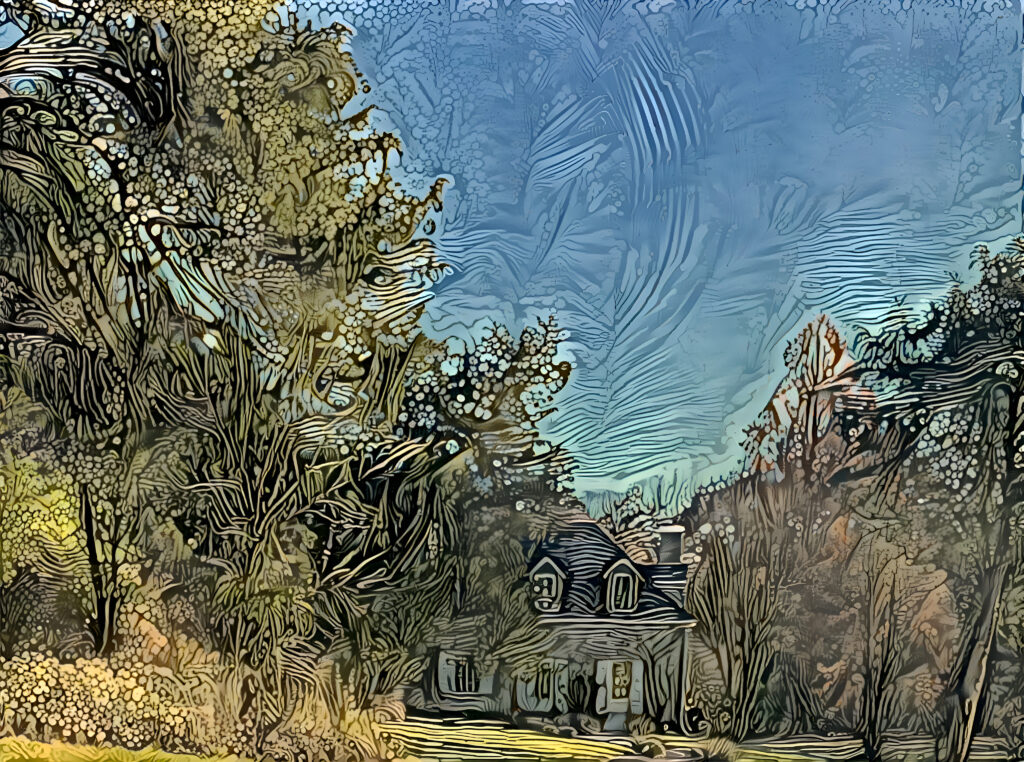I woke early, as I always do, and guided my power wheelchair down the ramp from the kitchen door onto the front walk. As I moved along the slate path and onto the driveway, my wheels crushed the lavender stalks spilling across the walkway. Their scent rose and lingered in the warming air, like a freshly laundered bedsheet.
On clear summer mornings, the sun rises over the tall oaks along the eastern ridge of the valley, and golden fingers of light stretch across the dewy lawn. I pause on the warm asphalt to glance back at the tidy house and blooming valley before continuing up the steep driveway.
At the top, I turn to take in the sweep of the valley and notice a strange sight—half a dozen Turkey Vultures roosting in a dead tree in the side yard. Their enormous black wings stretch wide—cruciform—soaking up the sun’s warmth, silhouetted against the brightening blue sky.
You usually see these birds soaring above the treetops—not hunting with sharp vision like birds of prey, but searching instead for the scent of death. You find them gathered along roadsides, feasting on the swollen remains of deer struck by vehicles moving faster than evolution ever prepared them to comprehend.
Once death is found, these black birds descend. A frenzy of sharp beaks tears flesh; bald heads plunge into body cavities, untouched by the gore that would otherwise mat feathers. Within minutes, the corpse is stripped clean—reduced to bones that foxes will later scatter through the woods after there’s nothing left to gnaw.
Feeding only on death, these birds have come to embody it.
Voiceless, they are born without the avian equivalent of a voice box, able only to hiss. Defenseless, their only weapon is to vomit the filth of their last meal at an aggressor—producing a stench foul enough to ruin any appetite but their own. Festering, their stomach acid is potent enough to protect them from the legion of bacteria that share their meals. Defiled, they defecate on their own legs to cool themselves and on their eggs to render them unpalatable to thieves.
Even their sleep mimics death. To conserve energy, they are among the few birds that allow their body temperatures to plunge into hypothermia overnight—necessitating that morning ritual, wings outstretched, warming in the sun, just as they did this morning in my side yard.
And yet, like our Gray Catbirds, their Latin name offers a quieter truth: Cathartes aura—“Cleansing Breeze.”
Look closely.
The Turkey Vulture is a psychopomp.
Like Hermes guiding souls to the Styx, like Valkyries bearing the fallen, or Azrael, the angel of death leading the faithful to paradise, these are bearers of passage to what lies beyond. Through these tearing beaks, through these black cauldron stomachs, and borne on broad, cruciform wings at dawn, the forest is reborn.
The animal fallen at the roadside does not fester, does not spread disease. Instead, it is purified. Resurrected. First lifted high above the treetops, riding warm currents of air, and then, gently, it returns to earth.
Joyfully rejoining all from which it arose—and all it ever truly was.
Forest.

One Response
Wow. I love this. I love learning about nature and how animals and insects have evolved and the roles they play in our ecosystem. Tons of great knowledge and delivered in a much better way than Wikipedia ever could!